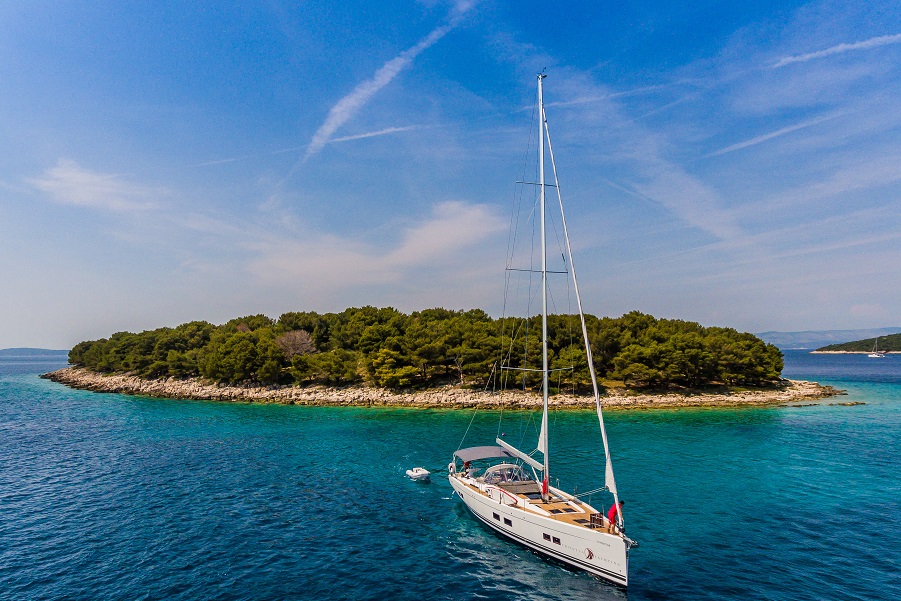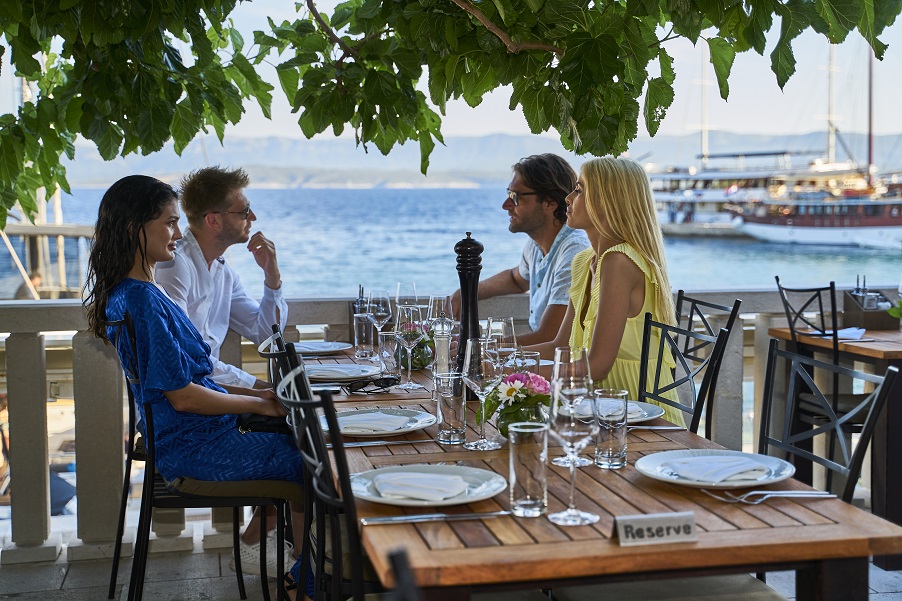Mediterranean Diet: The Healthiest in the World

The Mediterranean diet is considered one of the healthiest diets in the world, inspired by the eating habits of those living near the Mediterranean Sea. Included on the UNESCO list in 2013, the Mediterranean diet involves a ‘set of skills, knowledge, rituals, symbols, and traditions concerning crops, harvesting, fishing, animal husbandry, conservation, processing, cooking, and particularly the sharing and consumption of food,’ writes UNESCO.
Known as the standard of how Mediterranean countries dine today, the Mediterranean diet as a concept has existed since the 1950s and was first observed by American physiologist and doctor of science Ancel Key, with an emphasis on the cuisines of Greece, Italy, France, and Spain. It was later declared a reference nutrition model according to the World Health Organization in 1994. Observed by western countries including Spain, Italy, and Malta, Adriatic countries including Croatia, Bosnia and Herzegovina and Albania, Eastern countries including Greece, Lebanon, Cyprus, Turkey and Egypt, and North African countries including Libya, Algeria, Morocco and Tunisia, this diet is more than watching your ingredient intake - it’s a way of life.
So, what exactly is the Mediterranean diet?

The Mediterranean diet is based on simple plant-based cooking, focused on ecologically grown fruits and vegetables, fish, whole grains, beans, and seeds, with a few nuts and a strong emphasis on extra virgin olive oil. Fats other than olive oil are rarely used, and sugar and refined foods are reserved for special occasions, like birthdays, weddings, and big holidays.
The consumption of fish (Omega 3 fats) is highly encouraged within the Mediterranean diet, while eggs, dairy products, and poultry are eaten much less than in the traditional Western diet. Because it is a diet rich in fish and seafood, fresh fruits, and vegetables, the Mediterranean diet thrives in countries where olives are grown and olive oil is produced. After all, olive oil is the foundation of the diet, as it offers a high content of unsaturated fatty acids, polyphenolic compounds, and squalene.
Other popular ingredients in the Mediterranean diet? The low-calorie tomato is favored and contains several medicinal compounds such as lycopene and beta carotene - and when it comes to dairy? Milk is not consumed in large quantities, while there is a higher emphasis on cheese and yogurt. Few refined carbohydrates and processed and semi-finished products are eaten within the Mediterranean diet, while red meat is used more to flavor dishes than eaten.
Alcohol is a part of the Mediterranean diet but consumed in moderation and most often with food - and wine is the drink of choice. Namely, red wine has a healing effect when drunk in moderation. In addition, scientists believe that red wine contains phenolic compounds such as resveratrol, which combines with other antioxidant compounds from wine to affect the human body positively.
Each Mediterranean country observes this diet somewhat differently. Western countries favor pork, bread, potatoes, pasta, vegetables, and legumes, while the Adriatic areas have a higher intake of fish, white flour, and dairy products. Eastern countries prefer okra dishes and spices such as parsley and oregano, while African countries prefer rice, couscous, and barley flour.
But one thing reigns true for all - a varied Mediterranean diet satisfies all the body's needs for energy and nutrients. Meat and fish provide the necessary vitamin B12, iron, and fruits and vegetables with all the necessary antioxidants, vitamins, and minerals. One of the biggest characteristics of the Mediterranean diet is that the food is prepared at home and eaten in company, slowly and with pleasure. Furthermore, locally grown ingredients and many medicinal Mediterranean spices are also used in cooking. Social interactions during meals and exercise are fundamental to the Mediterranean eating style. Part of this regimen includes eating with friends and family, socializing during meals, consciously eating your favorite foods, and conscious movement and exercise. This doesn’t seem like too hard of a lifestyle change after all.
How does the Mediterranean diet help your health?

To be fair, in more ways than one. Those who follow the traditional Mediterranean diet are many times less likely to suffer from chronic diseases, especially cardiovascular disease, thanks to a high intake of unsaturated fatty acids, reduced intake of saturated fatty acids, low intake of meat and meat products, moderate alcohol intake, moderate intake of milk and dairy products, and high intake of bread, cereals and legumes. This, in turn, results in reduced incidence of cardiovascular disease, cancer, neurodegenerative diseases, and developing type 2 diabetes. In addition, those following a Mediterranean diet can count on a longer lifespan, improved breathing, a healthy body weight, improved eye and oral health, and increased fertility.
In January 2022, the Mediterranean diet was declared the best in the world for the fifth year in a row, according to the US News & World Report. And why wouldn’t it be after numerous studies have shown that the Mediterranean diet can reduce the risk of diabetes, high cholesterol, dementia, memory loss, depression, and breast cancer? Did we mention it's also associated with stronger bones and healthier hearts?
How is the Mediterranean diet honored in Croatia?
The Mediterranean diet is much more than the food you consume every day. It is how nature’s resources have been used throughout the centuries to create these sacred recipes and rituals. And in Croatia, the Mediterranean diet shines on the islands of Hvar and Brač.
Croatia was considered to represent the Mediterranean diet with the other selected countries after submitting several Mediterranean dishes in the Croatian Register of Cultural Heritage, including ‘mišini’ cheese aged in sheepskin, hrapoćuša cake from Brač, traditional makaruni desserts, Sinj arambašići, Pag cheese, soparnik, Brač specialty ‘vitalac’, and Stari Grad paprenjak. All are crucial parts of the Mediterranean diet that have been protected in the country. These dishes are still prepared today, whether in day-to-day life or on special occasions.
The Mediterranean diet on the Croatian Adriatic is formed by the historical and cultural heritage of the Mediterranean, but also age-old customs passed down from generation to generation. It is also conditioned by the Mediterranean's ecological and climatic factors and based on the identity of the people living in the area and the entire culinary system of the coast, islands, and inland parts.

The diet differs between villages, towns, and social status and can be divided into fishing and farming, or a combination of both, which is common on the islands. The basis of this diet comes down to the use of certain foods and how they are prepared and consumed in everyday life or during holidays. A way of life rooted in the land, the Mediterranean diet respects biodiversity and preserves and develops traditional activities related to fishing and animal husbandry in Mediterranean communities. The Mediterranean diet gives Croatia yet another intangible cultural asset to the UNESCO list to preserve specific life habits and heritage in the Mediterranean.
The diet differs between villages, towns, and social status and can be divided into fishing and farming, or a combination of both, which is common on the islands. The basis of this diet comes down to the use of certain foods and how they are prepared and consumed in everyday life or during holidays. A way of life rooted in the land, the Mediterranean diet respects biodiversity and preserves and develops traditional activities related to fishing and animal husbandry in Mediterranean communities. The Mediterranean diet gives Croatia yet another intangible cultural asset to the UNESCO list to preserve specific life habits and heritage in the Mediterranean.
How do I start the Mediterranean diet?
Like starting any new diet, it is essential to introduce these foods and gradually eliminate sweets, meat, and dairy products. Start by cooking one meal each week based on whole grains and vegetables, fish, herbs, and spices. Enrich your diet with old grains, like quinoa, amaranth, millet, farro, or spelt. When eating meat, eat small amounts, and use it most to flavor vegetable-based dishes. But what about when it comes to dessert? Think again. The Mediterranean diet usually ends with seasonal fruit.
And we can’t forget the most important part of the Mediterranean diet - use quality extra virgin olive oil as much as possible!
















